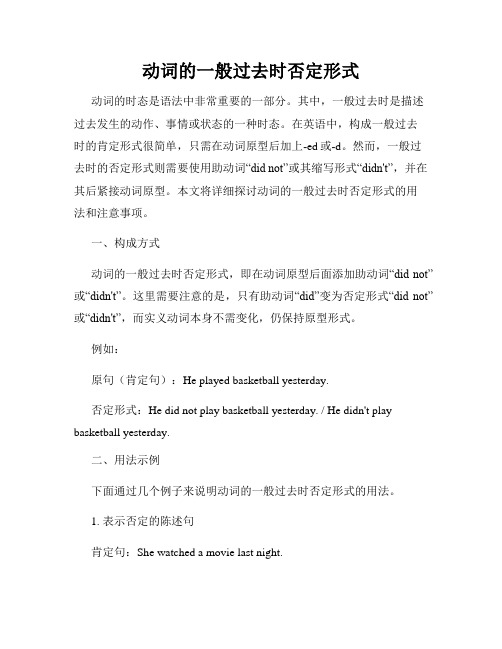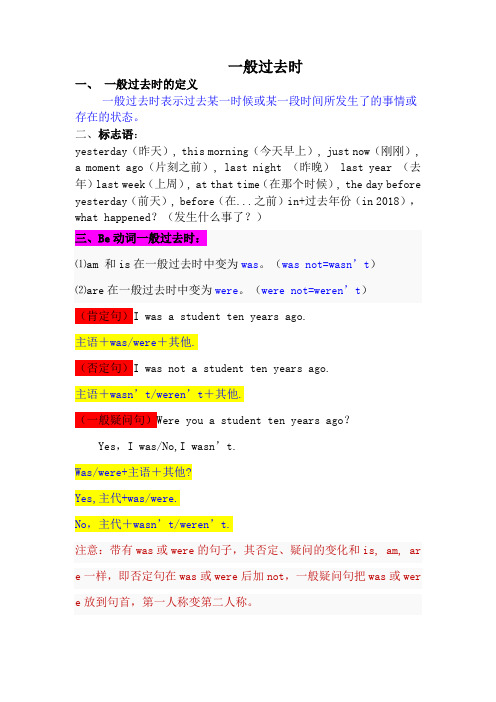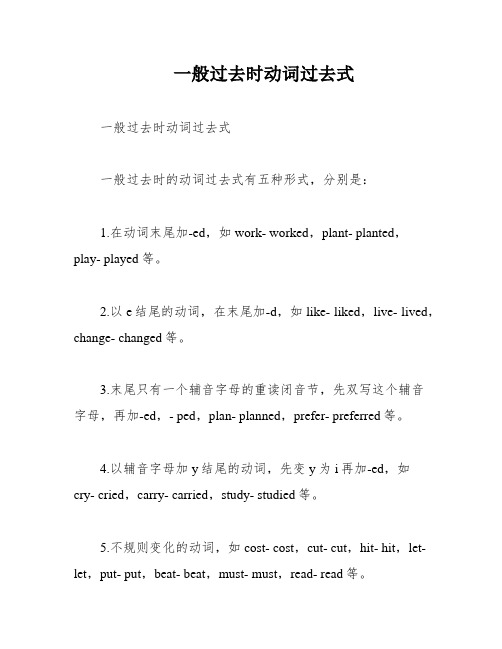动词的一般过去时
一般过去时

一般过去时动作发生在过去,动词使用过去式,规则动词后加- ed ,不规则动词特殊记忆,以do 为例变did。
表示过去存在的状态,就使用was 或were 。
有明确的时间状语提醒你,yesterday , last week / year , the day before yesterday , a moment ago 等等要谨记。
1.实意动词的一般过去时结构肯定式:S + V –ed / did sth .我们停下来同警察说话。
他带儿子去了电影院。
他们发现说英语很容易。
注:规则动词V-ed的读音规则清辅音后- ed浊辅音后-ed元音后-ed字母t , d 后- ed否定式:S + did not / didn’t + V 原sth .变形秘诀:肯定变否定,不论人称数,did not 起作用,动词还原形。
你没有告诉我关于昨晚的情况。
他们没来我家吃晚饭。
她不知道去车站的路。
一般疑问式:Did sb do sth ?变形秘诀:肯定变疑问,不论人称数,did 放句首,动词还原形。
你在聚会上玩得好吗?他们把书还给你了吗?昨天早饭吉姆吃的是鸡蛋吗?特殊疑问句:特殊疑问词+ did sb do sth ?昨天她进行了什么体育运动?她打篮球了。
你那次旅行带了几个包?带了三个。
为什么孩子们去了那个农场?他们去那儿摘苹果了。
2. be 动词的一般过去时结构肯定句中am / is 变was , are 变were , 否定not 添,变成疑问was / were 提句前。
昨天俱乐部有个party 。
上个月天气既不太冷也不太热。
格林先生昨天不在学校。
他们没有及时赶上那场比赛。
你和李雷上学期都在三年级吗?昨天这对双胞胎生病了吗?你出生在哪里?前天星期几?二、一般过去时的基本用法1.表示过去某时发生的动作或存在的状态。
2.表示过去经常或反复发生的动作3.表示过去特定时间一次完成的有先后顺序的具体动作。
一般过去时的用法

般过去时的用法一般过去时表示过去某个时间发生的动作或存在的状态,也表示过去经常或反复发生的动作。
谓语动词要用动词的过去式,常和表示过去的时间状语连用,女口:yesterday 昨天,last night 昨晚,last week 上周,last year 去年等。
一.一般过去时的结构(可分两类不同的结构)1. Be 动词的一般过去时在没有实义动词的句子中使用be 动词,am/is 的过去式为was ;are 的过去式were。
肯定句式:主语+be (was/were) + 其他.否定句式:主语+be (was/were) +not + 其他. 一般疑问句:Be (was/ were) + 主语+其他。
2. 实义动词的一般过去时态肯定句要使用动词的过去式,否定句和疑问句要使用助动词do/does 的过去式did.肯定句式:主语+动词(过去式)+ 其他。
否定句式:主语+ didn 't +动词(原形)+其他(did not= didn 't)一般疑问句:Did +主语+动词(原形)+ 其他(do, does 的过去式均为did)? 注: 1.did 和didn 't 是构成一般过去时的助动词,其特点是要在其后跟动词的原形。
2. 实义动词do 的一般过去时,例:Jim went home yesterday. --- Jim didn ' t go home yesterday.(否定句)--- Did Jim go home yesterday?(一般疑问句)--- What did Jim do yesterday?(特殊疑问句)二.一般过去时的判断标志词:yesterday,the day before yesterday,last+ 时间,this morning, 时间+ago,just now,a moment ago,in+ 过去的时间注意:一般过去时表示过去经常或反复发生的动作,常和often 经常,always ,总是,once a week 一周一次,等表示频度的时间状语连用动词过去式变化规则:1. 一般在动词末尾加ed, 如:pull--pulled, cook--cooked, play--played2. 结尾是e 力口d,女口: taste--tasted, live--lived, use--used3. 末尾是辅音字母加一个元音字母的重读闭音节,应双写末尾的辅音字母,再力口ed,女口:stop-stopped, plan--planned4. 以“辅音字母+y ”结尾的,变y为i,再加ed,如:study-studied5. 不规则动词过去式:(见课后)过去时练习选择( ) 1.What __________ they ____________ dinner yesterday?D.wanted; buyA.do; have forB.did; had for;C. LeavedD.was leaving( )2.Could you tell me what time _______________ t he plane?A.leftB.leavesC.leavedD.left( )3.One of us ______________ band last month.A. leavesB. leaveC.leavedD. left( )4.Where _______________ your mother born?A.areB. wasC.wereD.is ( )5.Do you know why he _______________ for class last year?A.was always lateB.always was lateC.is late alwaysD.is always late( )6.I got up _______________ this morning. So I ________ breakfast and went to school.te, didn 't haveB. Early, didn 't havete, hadn ' tD.early, hadn 't( )7.It ______________ much cold today than it ___________ yesterday.A.is, isB.was, wasC.is, wasD.was, is ( )8.He didn ' t come __________ goodbye to us and ________ away.A.say,goB.say, wentC.to say, wentD.to say, go( )9.Her pen was broken.She ________ to _______ a new one.A.wants, buysB.wanted, boughtC.wants,bought ( )10.I thought the dress ________ really pretty.A.isB. wasC./D.were( )11.I ______________ tired now, but it __________ an exciting day.A.am, wasB.was,wasC.was,isD.am,is( )12.He said he ____________ go to cook dinner for us.A.willB.wouldC./D.doesn ' t( )13.I stayed in the sitting room and _________ my friends all the time.A.talk toB.talkedC.talk aboutD.talked to( )14.She also __________ her _____ in a 1990s style.A.weared;hairB.wore;hairC.wear;hairD.wears;hairs( )15.I went to see you last Saturday, ________ t here _____ nobody inthe room.A. but;wasB.and;wereC.and;wasD.but;is二、用所给词的适当形式填空1. He put the books away and ________ (go)home.2. The boy is running and ________ (tie)his shoes on the playground.3. My father ________ (buy) a new computer for _________ (I)yesterday.4. He often ___________ (go)to school by bike,but last year heoften ___ (walk)to school.5. After she finished _________ (pack )everything,she ______________ (go)to school.6. ----Who ____ (wash)the plates on the table?----Jenny did.7. ----When ___ you _____ (see)the film “ Titanic ” ?8. It' s half past eleven now.Jim ____ (have)lunch.He usually ____ (have)itat this time.9. She _______ (write)to Jill last month.She __________ (write) to him nexttime.10. The students _____ (stop)talking when their teacher came up.三、句型转换1. The children had a good time in the park.否定句:____________________________________________________一般疑问句:________________________________________________________对划线部分提问:________________________________________________________ 2. There were about nine hundred people at the concert.( _____ 音乐会)对划线部分提问:________________________________________________________ 一般疑问句:________________________________________________________否定句:____________________________________________________3. There was only one problem.否定句:____________________________________________________一般疑问句:________________________________________________________肯定/否定回答:_________________________________________________________ 4. A nn did her homework yesterday eve ning.否定句:____________________________________________________一般疑问句:________________________________________________________对划线部分提问:________________________________________________________ 5. Last week I read an English book.否定句:____________________________________________________一般疑问句:________________________________________________________肯定/否定回答:_________________________________________________________ 对划线部分提问:________________________________________________________2. Frank read an interesting book about history._________ Frank ___________ an in terest ing book about history?3. He' s cleaning his rooms.____________ he ________________ ?4. Why not go out for a walk?__________ _________ __________ ___________ out for a walk? 5. Thomas spent RMB 10 on this book.Thomas __________ __________ RMB 10 on this book.6. My family went to the beach last week.___________ ___________ ___________ family ________ last week?7.I didn ' t have any friends.___________ __________ have ___________ friends?8.I think she is Lily 's sister.9. Sally often does some reading in the morning.Sally _________ often _________ some reading in the morning.10.He is a tall boy._________ _________ he __________ __________ ?六.翻译下列句子1.我过了一个忙碌却又刺激的周末。
动词的一般过去时与过去式结构和用法

visited
×
Did
×
×
didn’t
didn’t play
×
went
That’s great√
Find the mistakes and correct them
单/击/此/处/添/加/副/标/题
Thank you!
汇报人姓名
CLICK TO ADD TITLE
Grammar Focus
A. Regular verbs规则动词: 2. 以e结尾的+d e.g. live→lived dance→danced like→liked 3. 辅音字母+y结尾,变y为i+ed e.g. study→studied try→tried cry→cried
morning afternoon evening
与yesterday 连用:
单击此处添加小标题
4
2
Aim
01
构成
02
各种句式结构
03
规则动词过去式
04
不规则动词过去式
05
一般过去时
Grammar Focus
A. Regular verbs规则动词: 动词原形+ed e.g. clean→cleaned wash→washed stay→stayed watch→watched
did
went
had
came
read
saw
不规则动词的过去式无规则可循,要注意 自己积累。 部分不规则动词可参考书本六下U2-U4。
B. Irregular verbs: 不规则动词
1.ride-- 2.do-- 3.have-- 4.be-- 5.hurt-- 6.buy-- 7.take-- 8.run-- 9.read-- 10.see-- 11.go-- 12.eat-- 13.buy-- 14. sleep--
动词的一般过去时否定形式

动词的一般过去时否定形式动词的时态是语法中非常重要的一部分。
其中,一般过去时是描述过去发生的动作、事情或状态的一种时态。
在英语中,构成一般过去时的肯定形式很简单,只需在动词原型后加上-ed或-d。
然而,一般过去时的否定形式则需要使用助动词“did not”或其缩写形式“didn't”,并在其后紧接动词原型。
本文将详细探讨动词的一般过去时否定形式的用法和注意事项。
一、构成方式动词的一般过去时否定形式,即在动词原型后面添加助动词“did not”或“didn't”。
这里需要注意的是,只有助动词“did”变为否定形式“did not”或“didn't”,而实义动词本身不需变化,仍保持原型形式。
例如:原句(肯定句):He played basketball yesterday.否定形式:He did not play basketball yesterday. / He didn't play basketball yesterday.二、用法示例下面通过几个例子来说明动词的一般过去时否定形式的用法。
1. 表示否定的陈述句肯定句:She watched a movie last night.否定句:She did not watch a movie last night. / She didn't watch a movie last night.2. 表示否定的一般疑问句肯定句:They visited their grandparents.否定句:Did they not visit their grandparents? / Didn't they visit their grandparents?3. 表示否定的特殊疑问句(以疑问词开头)肯定句:He ate breakfast at home.否定句:Where did he not eat breakfast? / Where didn't he eat breakfast?4. 表示否定的祈使句肯定句:Come to the party tomorrow.否定句:Do not come to the party tomorrow. / Don't come to the party tomorrow.三、注意事项在使用动词的一般过去时否定形式时,需要注意以下几点:1. 助动词“did”在否定形式中需要发音缩写为“didn't”。
一般过去时知识点

一般过去时一、一般过去时的定义一般过去时表示过去某一时候或某一段时间所发生了的事情或存在的状态。
二、标志语:yesterday(昨天), this morning(今天早上), just now(刚刚), a moment ago(片刻之前), last night (昨晚) last year (去年)last week(上周), at that time(在那个时候), the day before yesterday(前天), before(在...之前)in+过去年份(in 2018),what happened?(发生什么事了?)三、Be动词一般过去时:⑴am 和is在一般过去时中变为was。
(was not=wasn’t)⑵are在一般过去时中变为were。
(were not=weren’t)(肯定句)I was a student ten years ago.主语+was/were+其他.(否定句)I was not a student ten years ago.主语+wasn’t/weren’t+其他.(一般疑问句)Were you a student ten years ago?Yes,I was/No,I wasn’t.Was/were+主语+其他?Yes,主代+was/were.No,主代+wasn’t/weren’t.注意:带有was或were的句子,其否定、疑问的变化和is, am, ar e一样,即否定句在was或were后加not,一般疑问句把was或wer e放到句首,第一人称变第二人称。
(特殊疑问句)1.对I提问:Who was a student ten years ago?(Who作为主语时,谓语动词用三单)四、实义动词一般过去时:(肯定句)I walked to school yesterday.主语+动词过去式+其他.(否定句)I didn’t walk to school yesterday.主语+didn’t + 动词原形+其他.否定句变化规则:1、找be动词2、若无be动词,找情态动词(could)3、若无情态动词,请助动词(did)来帮助4、did放于主语的后面,动词的前面,加上not,did not= didn't5、动词变原形6、some->any and->or too->either(一般疑问句)Did you walk to school yesterday?Yes,I did. No,I didn’t.Did +主语+动词原形+其他?Yes,主代+did.No,主代+didn’t.一般疑问句变化规则:1、找be动词2、若无be动词,找情态动词(could)3、若无情态动词,请助动词(did)来帮助4、did放于开头,首字母大写5、第一人称变第二人称6、动词变原形7、some->any and->or too不变either(特殊疑问句)I went to school on foot yesterday.1.对I 提问:Who went to school on foot yesterday?2.对went to school 提问:What did you do on foot yesterday?3.对school 提问:Where did you go on foot yesterday?4.对on foot 提问:How did you go to school yesterday?5.对yesterday提问:When did you go to school on foot?动词变化规则:1、直接在动词后面加ed。
一般过去时知识点

一般过去时一、基础知识点1.定义:表示过去发生的某个动作或状态2.构成:主语+ 动词的一般过去式+ 其他3.标志词:yesterday 昨天yesterday+时间last+时间ago 之前before 在….之前the day before yesterday 前天just now 刚才4.动词的一般过去时变化规律:⑴一般情况直接在词尾加+ ed,如:cook-cooked wash-washed⑵以不发音的e 结尾的动词,在词尾+ d 如:like-liked live-lived⑶以重读闭音节结尾的动词,双写最后一个字母再在词尾+ed 如:stop-stopped shop-shopped plan-planned 计划⑷以辅音字母+y 结尾的动词,要改y 为i 再加ed 如:study-studied carry- carried 运送,搬运另外须记不规则动词的一般过去时变形。
一般过去时的做题步骤:⑴先找到句子中表示一般过去时的标志词⑵确定句子的动词是用be动词还是行为动词Be动词的过去时练习一、用be动词的适当形式填空1.I _______ at school just now.2.He ________ in Beijing on vacation last week.3.We ________ students two years ago.4.They ________ on the farm a moment ago.5.Yang Ling ________ eleven years old last year.6.There ________ an apple on the plate yesterday.7.There ________ some milk in the fridge on Sunday.二、用行为动词的适当形式填空1. He _________ (live) in Wuxi two years ago.2. The cat ________ (eat) a bird last night.3. We _______ (have) a party last Halloween.4. Nancy ________ (pick) up oranges on the farm last week.5. I ________ (make) a model ship with Mike yesterday.6. They ________ (play) chess in the classroom last PE lesson.7. My mother _______ (cook) a nice food last Spring Festival.二、基本句型转换1.一般过去时的否定句构成:有be 动词和没有be 动词两种情况⑴如果有be动词,要先找到be 动词,再在be动词后加not即主语+ be + not + 其他举例:She was very happy.分析:She 为句子主语,was 为be 动词,故She was not very happy. was not= wasn’t⑵如果没有be 动词,我们就要借用助动词didn’t, 并放在动词前面。
一般过去时动词过去式

一般过去时动词过去式一般过去时动词过去式一般过去时的动词过去式有五种形式,分别是:1.在动词末尾加-ed,如work- worked,plant- planted,play- played等。
2.以e结尾的动词,在末尾加-d,如like- liked,live- lived,change- changed等。
3.末尾只有一个辅音字母的重读闭音节,先双写这个辅音字母,再加-ed,- ped,plan- planned,prefer- preferred等。
4.以辅音字母加y结尾的动词,先变y为i再加-ed,如cry- cried,carry- carried,study- studied等。
5.不规则变化的动词,如cost- cost,cut- cut,hit- hit,let- let,put- put,beat- beat,must- must,read- read等。
其他不规则变化的动词还有:e- became,come- came,run- ran,bring- brought,catch- caught,dig- dug,feel- felt,have/ has- had,hear- heard,hold- held,keep- kept,will- would,lend- lent,leave- left,make- made,meet- met,pay- paid,say- said,sell- sold,send- sent,shine- shone,sit- sat,sleep- slept,shall- should,spend- spent,tell- told,think- thought,am/ is- was,are- were,begin- began,blow- blew,may- might,break- broke,do- did,draw- drew,drink- drank,drive- drove,eat- ate,fall- fell,fly- flew,et- ot,give- gave,know- knew,lie- lay,ring- rang,see- saw,swim- swam,take- took,wear- wore,write- wrote,learn- learnt/ learned,go- went,grow- grew,mistake- mistook,ride- rode,sing- sang,speak- spoke等。
动词的一般过去时变化规律

一般过去式的变化规则:1、一般在动词末尾加-ed;2、结尾是e加d;3、末尾只有一个元音字母和一个辅音字母的重读闭音节,应双写末尾的辅音字母,再加-ed,;4、以“辅音字母+y”结尾的,变y为i,再加-ed;5、不规则动词过去式:am,is-was are-were do-did see-saw say-said give-gave get-got go-went come-came have-had eat-ate;3、末尾只有一个元音字母和一个辅音字母的重读闭音节,应双写末尾的辅音字母,再加-ed,;4、以“辅音字母+y”结尾的,变y为i,再加-ed;5、不规则动词过去式:am,is-was are-were do-did see-saw say-said give-gave get-got go-went come-came have-had eat-ate;扩展一般过去时表示过去某个时间里发生的动作或状态;过去习惯性、经常性的动作、行为。
在英语语法中,“时“指动作发生的时间,”态“指动作的样子和状态。
一般过去时句法结构:1、肯定形式:主语+动词过去式+其他2、否定形式主语+didn't +谓语动词原形+其他①was/were+not;②在行为动词前加didn't,同时还原行为动词3、一般疑问句①Did+主语+谓语动词原形+其它?②Was/Were+主语+表语?4、一般过去时的特殊疑问句疑问词+ did+主语+动词原形+其他?疑问词+was/were+物主代词/...'s+sth.?5、被动语态主语+ was / were + 动词的过去分词。
- 1、下载文档前请自行甄别文档内容的完整性,平台不提供额外的编辑、内容补充、找答案等附加服务。
- 2、"仅部分预览"的文档,不可在线预览部分如存在完整性等问题,可反馈申请退款(可完整预览的文档不适用该条件!)。
- 3、如文档侵犯您的权益,请联系客服反馈,我们会尽快为您处理(人工客服工作时间:9:00-18:30)。
动词的一般过去时一般过去时主要表示过去的动作或状态。
在句子中由主语+动词的过去式来表达。
1.He walks to school. (一般现在时)他现在经常步行上学。
2.He walked to school. (一般过去时) 他曾经步行上学。
1.中的动词walks是现在式,由于主语是第三人称单数he, 因此原形的walk必须加上”s”, 表示目前习惯性、经常性的动作。
而2. 中的动词walked是过去式,过去式是叙述过去事情的动词形式,所以这句话是表示过去的某时,例如昨天,上周或几天前等过去的某一时间。
1.be动词的过去时be动词过去时的句型如下:肯定句主语+be动词的过去式(was,were)+ .......否定句主语+be动词的过去式(was,were)+ not+ ......疑问句 be动词的过去式(Was,Were)+主语+......He was busy yesterday. 他昨天很忙。
(肯定句)We were busy yesterday. 我们昨天很忙。
(肯定句)He was not busy yesterday. 他昨天不忙。
(否定句)Was he busy yesterday? 他昨天忙吗?(疑问句)① be动词过去时的肯定句Mike was in the United States last year. 迈克去年在美国。
I was busy yesterday. 我昨天很忙。
I was verytiredlast night. 我昨天晚上很累。
He was an engineer. 他以前是个工程师。
Tom was a teacher. 汤姆以前是个老师。
We were there. 我们曾在那里。
You were a worker. 你以前是个工人。
They were at home yesterday. 他们昨天在家。
Jack and Bob were in the living room at that time. 杰克和鲍勃那时在起居室。
There was an apple on the plate yesterday. 昨天有一个苹果在盘子里。
There were some books there. 那儿曾经有一些书。
② be动词过去时的否定句He was not in Canada last year. 他去年不在加拿大。
be动词过去时的否定句的结构和现在时一样,只要在be动词过去式(was, were)后面加上not就可以了。
否定式的was not,were not大多使用缩写形式wasn’t(读作['wɒznt])和weren’t(读作 [wɜ:nt])。
Mike wasn’t at school. 迈克不在学校。
I wasn’t busy the other day. 前几天我不忙。
They weren’t Chinese. 他们不是中国人。
There weren’t any boys in the classroom. 教室里一个男孩也没有。
③ be动词过去时的疑问句1. A: Was it raining in Beijing yesterday? 昨天下雨了吗?B:No, it wasn’t. It was cloudy. 不,没下雨。
昨天阴天。
2. A:Where were you yesterday morning? 你昨天上午在哪儿?B: I was at school. 我在学校。
be动词过去时一般疑问句的结构和一般现在时一样,只要把be动词的过去式was,were调到主语前面即可。
回答Was/Were+主语+......?时,需用Yes,...was/were, 或No,...wasn’t/weren’t。
注意:以疑问词开始的特殊疑问句,回答时,不能用Yes,No。
直接回答所问的问题即可。
1. A:Was she a teacher? 她以前是个老师吗?B: Yes, she was. 是的,她是。
B: No, she wasn’t. 不,她不是。
2. A: Were they doctors? 他们以前是医生吗?B: Yes, they were. 是的,他们是。
B: No, they weren’t. 不,他们不是。
3.A: Was your father free this morning? 今天上午你爸爸有空吗?B: Yes, he was. 是的,他有空。
B: No, he wasn’t. 不,他没空。
4.A: Was there any water in the bottle? 瓶子里有过水吗?B: Yes, there was. 是的,曾经有过。
B: No, there weren’t. 不,没有过。
be动词的现在时和过去时句型(以he为主语)一般现在时一般过去时句型时态肯定句He is... He was...否定句He isn’t... He wasn’t...一般疑问句Is he...? Was he...?特殊疑问句疑问词+ is he...? 疑问词+ was he...?2.一般动词的过去时一般动词过去时的基本句型如下:肯定句主语+ be动词的过去式+ .......否定句主语+ did not+ 动词原形+......疑问句 Did+主语+ 动词原形+......?He played tennis last week. 他上周打网球了。
(肯定句)He did not play tennis last week. 上周他没打网球。
(否定句)Did he play tennis last week? 他上周打网球了吗?①一般动词过去时的肯定句We had a good time yesterday. 昨天我们过得很高兴。
He had a good time yesterday. 昨天他过得很高兴。
一般过去时没有人称和数的变化。
因此主语即使是第三人称单数,也和其他人称一样变化。
I saw a film last week. 上周我看了一部电影。
She studied English two years ago. 两年前她学英语。
We said good-bye to Mary at five. 五点钟时,我们和玛丽说再见。
He rushed into the room. 他冲进房间。
动词过去式变化规则:①一般情况下在动词原形后直接加-ed。
wanted,played②以不发音的字母e结尾的动词,直接加-d。
hoped,lived③重读闭音节单词如果末尾只有一个辅音字母需双写最后一个辅音字母,再加-edstopped④以辅音字母+y结尾的动词变y为i,再加-ed。
studied,worried以元音字母+y结尾的动词,直接加-ed. played, enjoyed规则动词过去式的读音也有规律可循。
请记住:清后[t],元浊[d],[t] [d]之后读[id]。
①清辅音后,ed要读[t]。
worked,finished②元音或浊辅音后,ed要读 [d]。
lived,called③ [t]或[d]后,ed读[id]。
started,needed5.不规则动词过去式:注意不规则动词的时态变化。
务必熟记下述动词的原形和过去式:read ---- read say ---- said know ---- knew put ---- putgo ---- went get ---- got have ---- had see ---- sawtake ---- took do ---- did come ---- came give---- gaveeat---- ate run---- ran sing---- sang make---- madewrite---- wrote draw---- drew fly---- flew ride---- rodespeak---- spoke sweep---- swept sit---- sat swim---- swam②一般动词过去时的否定句We did not have a good time yesterday. 昨天我们过得不好。
He did not do his homework. 他没做作业。
一般动词过去时否定句的结构和一般现在时否定句的结构一样,不论主语是第几人称,还是单、复数,在主语后面加上did not(而不是do not或does not)就可以了。
否定式did not常用缩写形式didn’t,读作['didnt]。
He didn’t have lessons this morning. 今天上午他没课。
You didn’t do your best to do it. 你没有尽力去做。
I didn’t work overtime yesterday. 我昨天没有加班。
注意:didn’t后的动词,一定要用动词原形。
③一般动词过去时的疑问句1. A: Did he go there? 他去那儿了吗?B: Yes, he did./ No, he didn’t. 是的,他去了。
/ 不,他没去。
2.A: When did you get up this morning? 今天早晨你几点起床的?B: At six. 六点钟。
一般动词过去时一般疑问句的结构和一般现在时一般疑问句的结构一样,无论主语是第几人称,是单、复数,在主语前面加上Did即可。
1. A: Did Tom go with you? 汤姆和你一起去吗?B: Yes, he did. 是的。
B: No, he didn’t. 不,不是的。
切记:在过去时的问句中,因为句首用了Did, 谓语动词要用原形。
2.A: How many subjects did you study last term? 上学期你们学习了几门课?B: We studied seven. 我们学习了七门课。
比较:表示具体的科目、学科,不能用lesson,而要用subject。
表示教科书上的第几课,要用lesson,如lesson2。
一般动词的现在时和过去时的比较(以go为例)一般现在时一般过去时句型时态肯定句I go...He goes... I went... He went...否定句I don’t go...He doesn’t go... I didn’t go... He didn’t go...疑问句Do you go...?Does he go...? Did you go...? Did he go...?3.一般过去时的基本用法A.带有确定的过去时间状语时,要用过去时。
